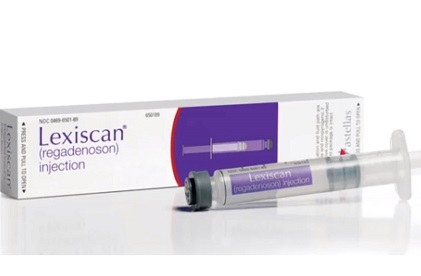COVID-19 Drugs: University of Maryland Study Finds That Regadenoson Can Be Used In COVID-19 Treatment As It Produces Rapid Anti-Inflammatory Effects!
Thailand Medical News Team Aug 17, 2023 2 years, 6 months, 6 days, 22 hours, 11 minutes ago
COVID-19 Drugs: The global pandemic caused by Severe Acute Respiratory Syndrome Coronavirus 2 (SARS-CoV-2) led to unprecedented challenges in healthcare systems and research worldwide. As medical professionals tirelessly sought effective treatments for COVID-19, a groundbreaking study conducted at the University of Maryland in the United States offers new hope.

The study sheds light on the potential of regadenoson, a selective adenosine A2A receptor (A2AR) agonist, to produce rapid anti-inflammatory effects in the treatment of COVID-19 patients.
Background and Rationale for the Study
The study's foundation lies in the understanding of adenosine's role in modulating immune responses and inflammation. Adenosine has been shown to inhibit immune cell and platelet activation, exerting anti-inflammatory effects primarily through the activation of A2ARs.
Regadenoson, a unique A2AR agonist, has garnered attention for its potential to reduce inflammation in various tissues, including lungs affected by hypoxia, ischemia, transplantation, or sickle cell anemia. These anti-inflammatory effects are primarily attributed to the suppression of invariant natural killer T (iNKT) cells, a subset of T cells that play a crucial role in immune responses.
One of the
COVID-19 Drugs study's central hypotheses is that regadenoson's impact is amplified in injured tissues due to the induction of A2ARs, CD39, and CD73 enzymes. These molecules contribute to the conversion of ATP to adenosine in the extracellular space, further promoting anti-inflammatory responses. By targeting iNKT cells and other immune cells, regadenoson could potentially offer a comprehensive solution to combat the cytokine storm - a hallmark of severe COVID-19 cases.
Study Design and Methodology
The study involved a carefully designed protocol that included five COVID-19 patients requiring supplemental oxygen but not intubation. These patients were administered intravenous (IV) infusions of regadenoson, with vital signs, arterial oxygen saturation, and blood samples collected before, during, and after the infusion. Various parameters, such as C-reactive protein (CRP), D-dimer, and levels of proinflammatory cytokines, were analyzed to assess the treatment's effects.
The results were remarkable and offered valuable insights into regadenoson's potential as a treatment option. Within 24 hours of the infusion, the patients exhibited increased oxygen saturation, decreased D-dimer levels, and a trend towards decreased CRP levels. Importantly, the activation of iNKT cells, a prominent feature in COVID-19 patients, was significantly reduced following regadenoson infusion. The study's findings indicated that regadenoson's anti-inflammatory effects were mediated by A2ARs on iNKT cells and potentially other immune cells and platelets.
Implications and Future Directions
The implications of this study are far-reaching and offer promising avenues for COVID-19 treatment. By targeting iNKT cells and mitigating their activation, regadenoson holds the potential to alleviate the cytokine storm and associated inflammation obser
ved in severe COVID-19 cases. The study's findings also align with the growing understanding of the role of adenosine signaling in immune responses, inflammation, and tissue repair.
While this study marks a significant step forward, it is important to note that the case series was limited to five patients and lacked a placebo-controlled design. To validate and further explore regadenoson's potential, larger clinical trials are essential. A placebo-controlled trial involving a more extensive patient cohort would provide a more comprehensive assessment of the treatment's safety and efficacy.
Furthermore, the study's success raises intriguing possibilities for future research. The investigation into regadenoson's effects on iNKT cells and inflammation extends beyond COVID-19 and could be relevant in addressing other inflammatory lung diseases and traumatic injuries.
Conclusion
The University of Maryland's study on regadenoson's rapid anti-inflammatory effects in COVID-19 treatment marks a significant advancement in our understanding of potential therapeutic strategies. By targeting iNKT cells and harnessing the power of A2AR activation, regadenoson offers a novel approach to addressing the cytokine storm and associated complications in severe COVID-19 cases. While further research is needed to validate and expand upon these findings, the study paves the way for a brighter future in the fight against COVID-19 and other inflammatory conditions. As the medical community continues to explore innovative treatments, regadenoson's potential to revolutionize patient outcomes holds great promise.
The study findings were published in the peer reviewed journal: PLOS One.
https://journals.plos.org/plosone/article?id=10.1371/journal.pone.0288920
For the latest
COVID-19 Drugs, keep on logging to Thailand Medical News.
